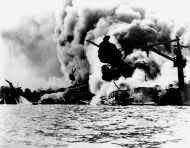Sundays would never be the same after Dec. 7, 1941: History
- Oops!Something went wrong.Please try again later.
On this early December Sunday afternoon, many coastal families gathered in the living room. Ads for Christmas gifts were starting to appear in the newspapers, but in the Friday, Dec. 5, edition the Delaware Pilot, there was an ominous warning that the United States would have to fight “a naval war with Japan in the Pacific.”
Sports fans tuned the radio to the professional football game between the Brooklyn Dodgers and the New York Giants. At that time, football was dominated by the college teams, but some sports-minded families liked to follow the professional teams.
On this Sunday, the broadcast of game took an unexpected turn when the announcer intoned, “We interrupt this broadcast to bring you this important bulletin from the United Press. Flash Washington. The White House announces Japanese attack on Pearl Harbor.”

Two hours after the first Japanese plane appeared, the American fleet had been delivered a stunning blow, with seven battleships reeling under the damage inflicted by the Japanese bombs and torpedoes.
Three of the warships were repaired in a matter of weeks, but three others took a year or more before they were able to get back into action; and two never returned to service.
In addition to the damage done to the American battleships, many of the aircraft at Hickam field had been caught on the ground, and the barrack had been particularly hard hit. Many of the enlisted men had been at breakfast when the attack began, and a Japanese bomb exploded in the mess hall and killed 35 men.
As news of the Japanese attack spread through the coastal region, workers for the 4-to-12 shift began to arrive at the new nylon plant in Seaford.
As workers went about their duties, foremen were called in for a series of emergency meetings. The possibility of enemy saboteurs seemed very real, and when the foremen returned to their crews, they dispatched men to patrol the perimeter of the facility.
On the Monday after the attack on Pearl Harbor, the students at the Lewes School solemnly filed into the school’s auditorium, where speakers and a special radio connection had been set up.
At 12:30 p.m., President Franklin Roosevelt began, “Yesterday, December 7th, 1941 — a date which will live in infamy, the United States of America was suddenly and deliberately attacked by naval and air forces of the Empire of Japan.”
As the students, teachers, and those at home listened, the president reviewed the diplomatic effort to avoid war, which, he said, “was deliberately planned many days or even weeks ago.”
Roosevelt said that the Japanese attack on Pearl Harbor had inflicted, “severe damage to American naval and military forces. I regret to tell you that very many American lives have been lost.”
After listing the other Japanese attacks in the Pacific, the president said a few words about the will of the American people to “make it very certain that this form of treachery shall never again endanger us.”
Roosevelt concluded, “Hostilities exist. There is no blinking at the fact that our people, our territory and our interests are in grave danger. With confidence in our armed forces, with the unbounding determination of our people, we will gain the inevitable triumph. So help us God. I ask that the Congress declare that since the unprovoked and dastardly attack by Japan on Sunday, December 7th, 1941, a state of war has existed between the United States and the Japanese Empire.”
In less than seven minutes, the president’s speech was over, the United States was at war, and Sunday afternoons would never be the same.
Principal sources:
Delaware Pilot, Dec. 5, 1941.
Delaware Coast News, Dec. 5, 1941.
Pearl Harbor Attack - Radio Bulletins, Dec. 7, 1941. https://www.youtube.com/watch?v=D-asDrt7ZMc
This article originally appeared on Salisbury Daily Times: Pearl Harbor history: Sundays would never be the same Dec. 7, 1941
